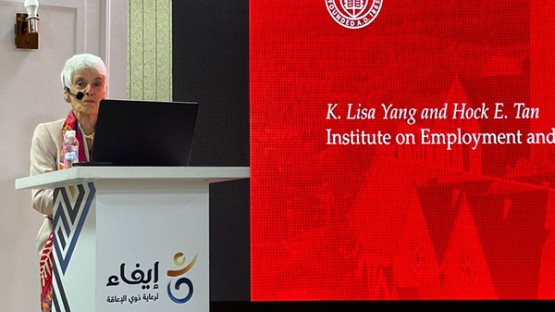As a disability rights activist, Suzanne Bruyère has spent her career researching and advocating for policy changes around inclusive employment, recently supported efforts to promote disability rights in Saudi Arabia.
Invited by the U.S. Department of State to participate in the U.S. Speakers Program, Bruyere, academic director of the ILR School’s K. Lisa Yang and Hock E. Tan Institute for Employment and Disability Studies, spent five days in the cities of Riyadh, Dammam and Jeddah delivering 15 talks with U.S. Embassy and U.S. Consulate officials and representatives from government agencies, employer associations, local volunteer groups serving people with disabilities, and higher education institutions.
“We need to take a comprehensive approach to improve employment outcomes for people with disabilities,” Bruyère said in an interview. “We need to have the support of governments and relevant laws to ensure rights and inclusive educational preparation.”
“In addition, we need meaningful engagement from employers and the voluntary sector, from community organisations that can support job training, development and job placement support. So it was important that the embassy team and I had the opportunity to engage with all these key stakeholders.”
According to Bruyère, people with disabilities make up 15% of the world’s population, more than one billion people, and the gap in access to jobs between people with and without disabilities is a perennial social and labor market challenge for policymakers.
To address this disparity, the United Nations passed the Convention on the Rights of Persons with Disabilities in 2006. Article 27 of the resolution states that the right of persons with disabilities to work must be actively supported by law. Therefore, countries that sign the resolution must enact laws to ensure that these rights are implemented at the national level, including Saudi Arabia.
Bruyère met with representatives from several Saudi Arabian institutions that write laws regulating the employment of people with disabilities, including the Ministry of Human Rights, the Ministry of Human Resources and Social Development, and the Saudi Arabian Authority for Disabled Persons.
“At a time when conflicts like this are happening in the Middle East, we must not lose sight of the fact that disability rights are also human rights,” Bruyère said, “a point of potential common understanding about the human condition that connects us all and transcends political and socio-cultural differences.”
“Opportunities like this enable institutions like Cornell to contribute to greater understanding between countries and people, further advancing disability rights around the world.”
Read the full article on the ILR website.
Julie Greco is a senior communications specialist at the ILR School.

